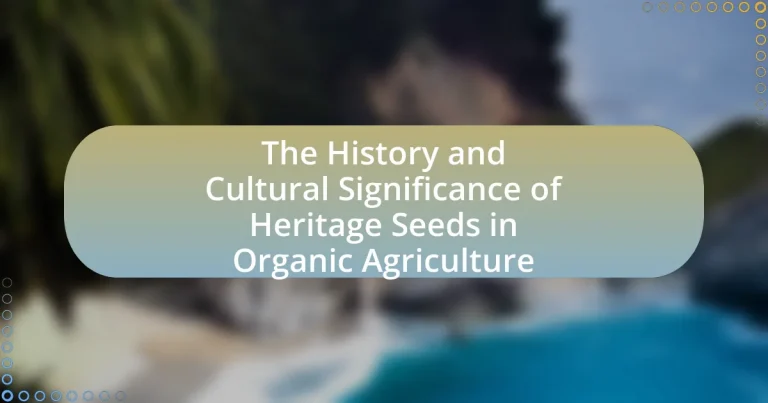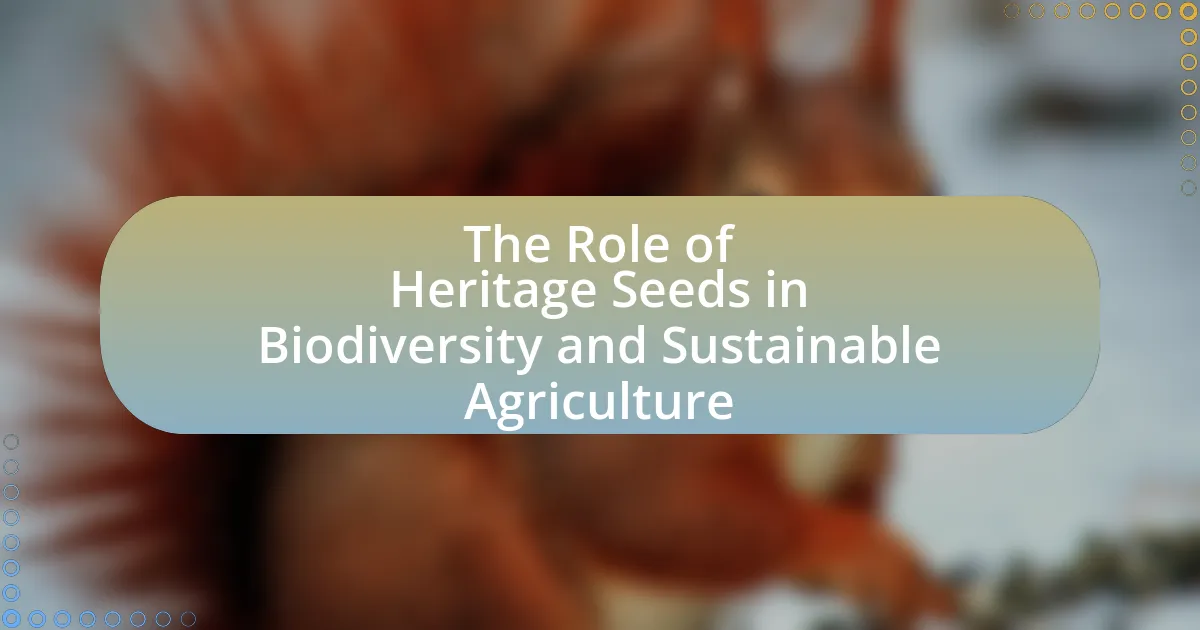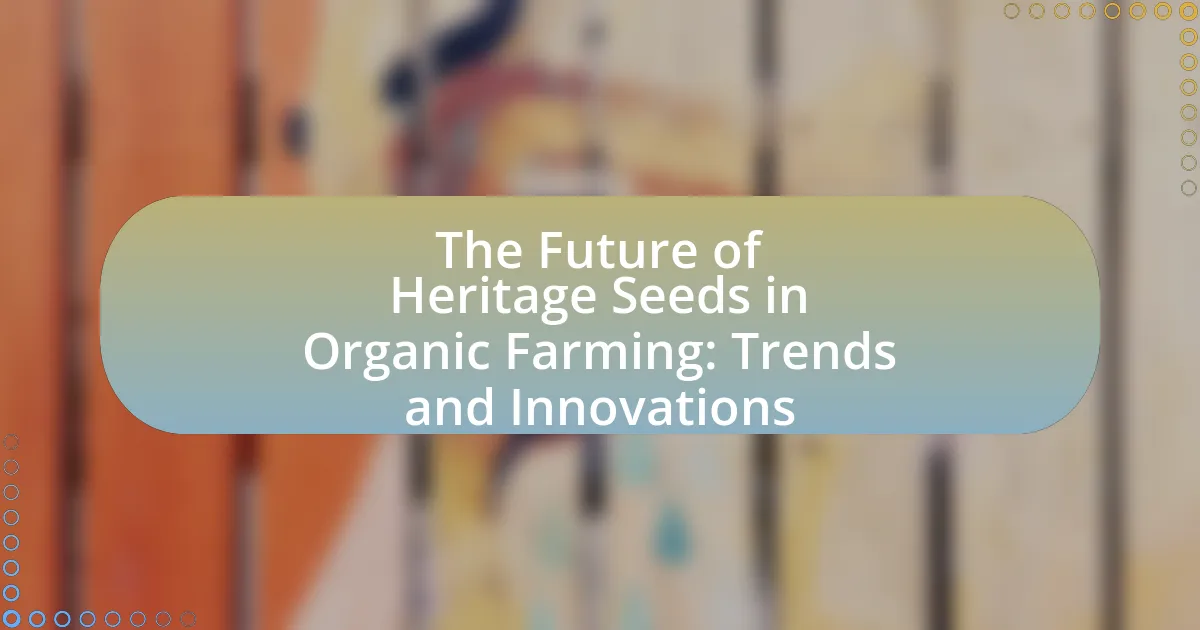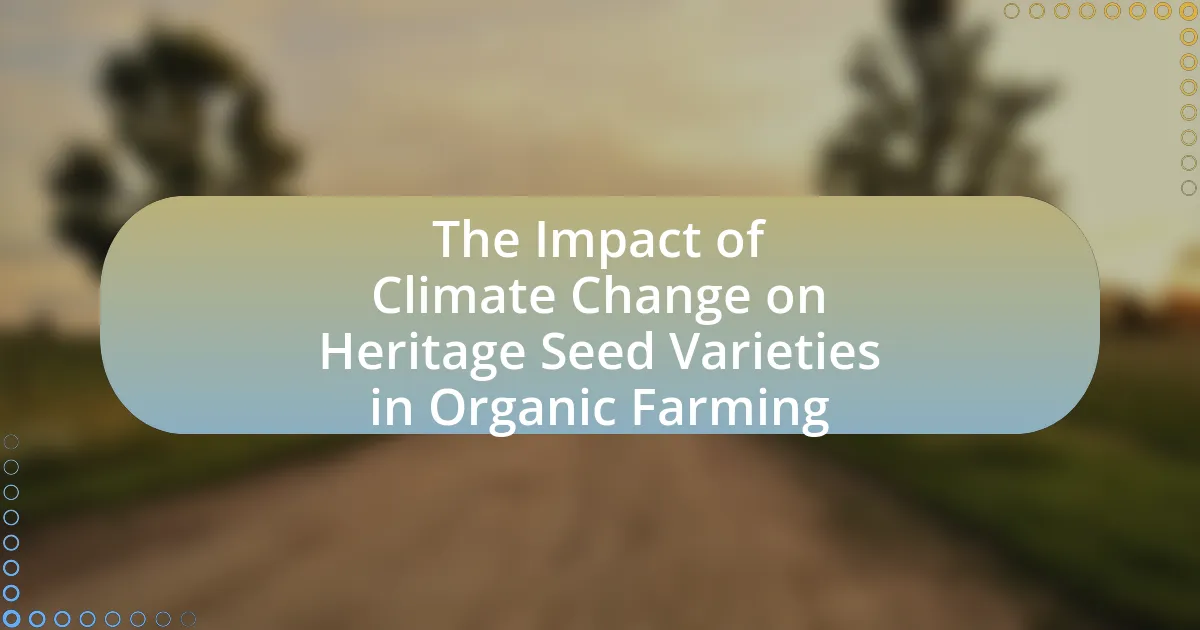Heritage seeds are traditional, open-pollinated varieties that have been cultivated and passed down through generations, playing a vital role in organic agriculture by promoting biodiversity, enhancing soil health, and improving crop resilience. This article explores the historical context, characteristics, and significance of heritage seeds, highlighting their differences from conventional seeds and their importance for food security and sustainable farming practices. It also examines the challenges and opportunities faced by farmers using heritage seeds, the impact of policies on their preservation, and the cultural practices associated with these seeds, ultimately emphasizing their contribution to ecological balance and agricultural sustainability.
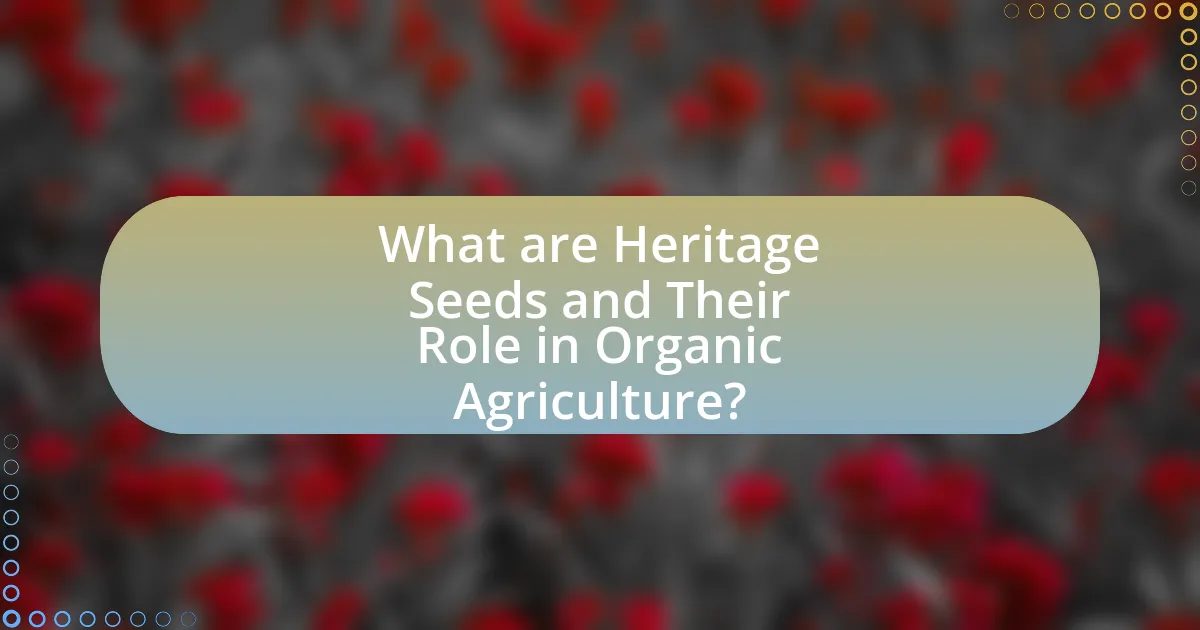
What are Heritage Seeds and Their Role in Organic Agriculture?
Heritage seeds are traditional varieties of seeds that have been passed down through generations, often characterized by their adaptability, flavor, and genetic diversity. In organic agriculture, heritage seeds play a crucial role by promoting biodiversity, enhancing soil health, and providing crops that are better suited to local growing conditions. These seeds are typically open-pollinated, meaning they can reproduce naturally, which supports sustainable farming practices. Research indicates that using heritage seeds can lead to increased resilience against pests and diseases, as well as improved nutritional value in crops, thereby contributing to the overall sustainability and ecological balance of organic farming systems.
How do heritage seeds differ from conventional seeds?
Heritage seeds differ from conventional seeds primarily in their genetic diversity and breeding practices. Heritage seeds are open-pollinated varieties that have been passed down through generations, maintaining their genetic traits and adaptability to local environments. In contrast, conventional seeds are often hybridized or genetically modified, focusing on traits like uniformity and high yield, which can reduce genetic diversity. Studies show that heritage seeds can contribute to biodiversity and resilience in agriculture, as they are better suited to withstand pests and climate variations, thus supporting sustainable farming practices.
What characteristics define heritage seeds?
Heritage seeds are defined by their open-pollinated nature, historical significance, and genetic diversity. These seeds have been passed down through generations, often for at least 50 years, and are adapted to local growing conditions, which enhances their resilience. Unlike hybrid seeds, heritage seeds can be saved and replanted, preserving unique traits and flavors that are often lost in commercial varieties. The genetic diversity found in heritage seeds contributes to agricultural sustainability and food security, as they can better withstand pests, diseases, and climate variations.
Why are heritage seeds important for biodiversity?
Heritage seeds are crucial for biodiversity because they preserve genetic diversity within plant species, which is essential for ecosystem resilience. These seeds represent a wide range of traits that can adapt to changing environmental conditions, pests, and diseases. For instance, heritage varieties often have unique characteristics that modern hybrids lack, such as drought resistance or disease tolerance, which can be vital for sustainable agriculture. Additionally, the Food and Agriculture Organization (FAO) emphasizes that maintaining diverse seed varieties helps ensure food security and agricultural sustainability, as it allows farmers to select crops that are best suited to their local environments.
What historical context surrounds the use of heritage seeds?
Heritage seeds have a historical context rooted in traditional agricultural practices that date back thousands of years. These seeds represent varieties that have been cultivated and passed down through generations, often adapted to local climates and conditions. Historically, before the rise of industrial agriculture in the 20th century, farmers relied on heritage seeds for their resilience, flavor, and nutritional value, which were essential for sustaining local communities. The introduction of hybrid and genetically modified seeds in the mid-20th century led to a decline in the use of heritage seeds, as these modern varieties often prioritized yield over biodiversity. This shift has prompted movements in recent decades to preserve heritage seeds, recognizing their importance for food security, cultural identity, and ecological sustainability.
How have heritage seeds been preserved over time?
Heritage seeds have been preserved over time through a combination of traditional farming practices, seed saving techniques, and community efforts. Farmers and gardeners have historically saved seeds from their best crops, ensuring the continuation of specific varieties that are well-adapted to local conditions. This practice has been supported by organizations and seed banks that collect, store, and distribute heritage seeds, maintaining genetic diversity. For instance, the Seed Savers Exchange, founded in 1975, has played a crucial role in preserving thousands of heirloom varieties by facilitating seed sharing among members. Additionally, cultural traditions and knowledge passed down through generations have contributed to the preservation of these seeds, allowing them to thrive in various agricultural systems.
What cultural practices are associated with heritage seeds?
Cultural practices associated with heritage seeds include traditional planting methods, seed saving, and community sharing. These practices are rooted in the preservation of biodiversity and the transmission of agricultural knowledge across generations. For instance, many indigenous cultures engage in seed saving, where farmers collect and store seeds from their best crops to ensure the continuation of specific varieties adapted to local conditions. This practice not only maintains genetic diversity but also fosters a sense of community as seeds are often shared among neighbors, reinforcing social bonds and cultural identity. Historical evidence shows that these practices have been vital for food security and resilience in farming systems, particularly in regions where modern agricultural methods have led to a decline in traditional varieties.
What significance do heritage seeds hold in organic farming practices?
Heritage seeds are significant in organic farming practices because they promote biodiversity and preserve traditional agricultural varieties. These seeds are often open-pollinated, allowing farmers to save seeds from their harvest, which fosters self-sufficiency and reduces dependency on commercial seed suppliers. Additionally, heritage seeds are adapted to local climates and soils, enhancing resilience against pests and diseases. Research indicates that using diverse seed varieties can lead to improved crop yields and sustainability in organic farming systems, as demonstrated in studies by the Organic Farming Research Foundation, which highlight the benefits of genetic diversity in agricultural resilience.
How do heritage seeds contribute to sustainable agriculture?
Heritage seeds contribute to sustainable agriculture by preserving genetic diversity and promoting resilience in crops. These seeds, often passed down through generations, are adapted to local climates and conditions, which enhances their ability to withstand pests, diseases, and environmental changes. Research indicates that using heritage seeds can lead to higher yields in organic farming systems, as they often require fewer chemical inputs and are more suited to organic practices. For instance, a study published in the journal “Agriculture, Ecosystems & Environment” found that farms using heritage varieties had a 20% increase in biodiversity compared to those using commercial hybrids, demonstrating their role in fostering ecological balance and sustainability in agriculture.
What are the benefits of using heritage seeds in organic farming?
Heritage seeds provide numerous benefits in organic farming, including enhanced biodiversity, improved resilience to pests and diseases, and superior flavor and nutritional value. These seeds, often passed down through generations, contribute to genetic diversity, which is crucial for adapting to changing environmental conditions. Studies have shown that heritage varieties can be more resilient, requiring fewer chemical inputs, thus aligning with organic farming principles. Additionally, heritage seeds often possess unique flavors and higher nutrient content compared to commercial hybrids, making them valuable for both farmers and consumers seeking quality produce.

How have Heritage Seeds Influenced Agricultural Practices Globally?
Heritage seeds have significantly influenced agricultural practices globally by promoting biodiversity and sustainable farming methods. These seeds, often passed down through generations, are adapted to local climates and conditions, which enhances resilience against pests and diseases. For instance, the use of heritage varieties has been linked to increased crop yields in regions where modern hybrids fail due to their lack of adaptability. Additionally, heritage seeds support organic agriculture by enabling farmers to cultivate crops without reliance on synthetic inputs, thereby fostering soil health and ecological balance. Studies have shown that farms utilizing heritage seeds can improve food security and preserve cultural heritage, as these seeds often carry historical significance and unique flavors that contribute to local cuisines.
What are the global trends in the use of heritage seeds?
Global trends in the use of heritage seeds indicate a significant resurgence in interest due to their role in biodiversity conservation and sustainable agriculture. Farmers and consumers are increasingly recognizing the value of heritage seeds for their adaptability to local climates and resistance to pests, which enhances food security. According to a report by the Food and Agriculture Organization (FAO), the global market for organic seeds, including heritage varieties, has been growing at a rate of approximately 10% annually, reflecting a shift towards organic farming practices that prioritize traditional seed varieties. This trend is further supported by initiatives aimed at preserving genetic diversity, as seen in various seed banks and community seed exchanges worldwide.
How do different cultures utilize heritage seeds in agriculture?
Different cultures utilize heritage seeds in agriculture by preserving traditional varieties that are adapted to local climates and ecosystems. For instance, Indigenous communities in North America cultivate heritage corn varieties that have been passed down through generations, ensuring biodiversity and resilience against pests and diseases. In Italy, farmers grow ancient wheat varieties, such as Emmer, which are valued for their unique flavors and nutritional profiles. These practices not only maintain agricultural diversity but also support cultural identity and sustainable farming methods. Research indicates that heritage seeds contribute to food security and ecological balance, as they often require fewer chemical inputs and are more resilient to climate change.
What role do heritage seeds play in food security worldwide?
Heritage seeds play a crucial role in food security worldwide by preserving genetic diversity and enabling sustainable agricultural practices. These seeds, often adapted to local climates and conditions, contribute to resilient food systems that can withstand pests, diseases, and climate change. For instance, heritage varieties can yield crops that are more nutritious and better suited to local diets, enhancing food availability and accessibility. According to the Food and Agriculture Organization, maintaining a diverse gene pool through heritage seeds is essential for ensuring food security, as it allows farmers to select varieties that perform best under specific environmental stresses.
How have policies impacted the preservation of heritage seeds?
Policies have significantly impacted the preservation of heritage seeds by establishing legal frameworks that protect biodiversity and promote sustainable agricultural practices. For instance, the International Treaty on Plant Genetic Resources for Food and Agriculture, adopted in 2001, encourages the conservation of genetic diversity, including heritage seeds, by facilitating access to genetic resources and sharing benefits derived from their use. Additionally, national policies, such as those in India, have implemented seed banks and community seed programs that empower local farmers to maintain and cultivate heritage varieties, thereby enhancing food security and cultural heritage. These policies create an environment that fosters the conservation of heritage seeds, ensuring their availability for future generations.
What regulations exist to protect heritage seeds?
Regulations that protect heritage seeds include the Plant Variety Protection Act (PVPA) in the United States, which grants exclusive rights to breeders of new varieties, including heritage seeds, while allowing for the preservation of traditional varieties. Additionally, many countries have implemented seed laws that recognize and protect traditional and heritage seeds, ensuring their conservation and use in agriculture. For example, the International Treaty on Plant Genetic Resources for Food and Agriculture promotes the conservation of genetic diversity, including heritage seeds, by encouraging sustainable practices and equitable sharing of benefits. These regulations are crucial for maintaining biodiversity and supporting sustainable agriculture practices.
How do these policies affect farmers and consumers?
Policies regarding heritage seeds in organic agriculture significantly impact farmers and consumers by influencing seed availability and agricultural practices. Farmers benefit from these policies through increased access to diverse seed varieties, which can enhance crop resilience and sustainability. For instance, regulations that support the preservation of heritage seeds allow farmers to cultivate crops that are better adapted to local conditions, potentially leading to higher yields and reduced reliance on chemical inputs.
Consumers are affected as well, as these policies can lead to a greater variety of organic produce in the market, promoting biodiversity and potentially improving food quality. Research indicates that heritage seeds often have superior flavor and nutritional value compared to conventional varieties, which can enhance consumer satisfaction and health outcomes. Thus, the interplay of these policies fosters a more sustainable agricultural system that benefits both farmers and consumers.
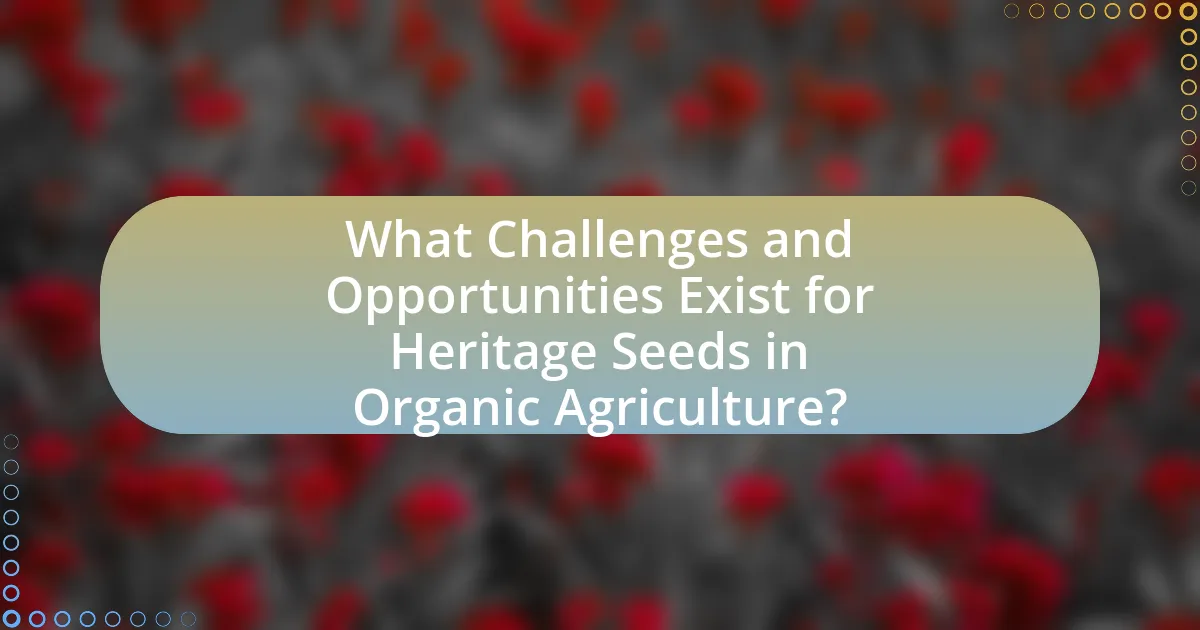
What Challenges and Opportunities Exist for Heritage Seeds in Organic Agriculture?
Heritage seeds face significant challenges and opportunities in organic agriculture. The primary challenge is the risk of genetic erosion due to the dominance of hybrid and genetically modified seeds, which can lead to a loss of biodiversity. Additionally, heritage seeds often require more specific growing conditions and may be less resistant to pests and diseases compared to modern varieties, making them more challenging for farmers to cultivate successfully.
Conversely, the opportunities for heritage seeds in organic agriculture include their potential to enhance biodiversity and resilience in farming systems. Heritage seeds often possess unique flavors and nutritional profiles, appealing to niche markets and consumers seeking organic and locally sourced produce. Furthermore, the increasing consumer awareness of sustainable practices and the demand for organic products create a favorable market environment for heritage seeds. Studies have shown that organic farms utilizing heritage varieties can contribute to sustainable agriculture by preserving genetic diversity and promoting ecological balance.
What challenges do farmers face when using heritage seeds?
Farmers face several challenges when using heritage seeds, including lower yields compared to hybrid varieties, susceptibility to pests and diseases, and limited availability of seeds. Heritage seeds often produce less than modern hybrids, which can impact overall productivity and profitability. Additionally, these seeds may lack the genetic resistance to pests and diseases that hybrids possess, making crops more vulnerable and potentially leading to increased reliance on pesticides. Furthermore, the availability of heritage seeds can be restricted due to fewer suppliers and the need for farmers to save seeds from their own crops, which may not always be feasible.
How do climate change and environmental factors impact heritage seeds?
Climate change and environmental factors significantly impact heritage seeds by altering their growing conditions and reducing biodiversity. Increased temperatures, altered precipitation patterns, and extreme weather events can stress these traditional varieties, making them less viable in their native habitats. For instance, a study published in the journal “Agricultural Systems” found that heritage seeds often have lower resilience to climate variability compared to modern hybrids, which are bred for specific conditions. Additionally, environmental changes can lead to the loss of genetic diversity, as certain heritage varieties may not adapt quickly enough to shifting climates, threatening their survival and the agricultural practices that rely on them.
What economic barriers exist for farmers adopting heritage seeds?
Farmers face several economic barriers when adopting heritage seeds, primarily including higher initial costs, limited access to markets, and potential yield variability. The initial investment for heritage seeds can be significant, as they often require more resources for cultivation and management compared to conventional seeds. Additionally, farmers may struggle to find markets willing to pay premium prices for heritage crops, which can limit their profitability. Yield variability is another concern, as heritage seeds may not produce consistent results, leading to financial uncertainty. According to a study published in the Journal of Agricultural and Environmental Ethics, these economic challenges can deter farmers from transitioning to heritage seeds, despite their ecological and cultural benefits.
What opportunities can arise from promoting heritage seeds?
Promoting heritage seeds can create opportunities for biodiversity conservation, sustainable agriculture, and local economies. By preserving genetic diversity, heritage seeds contribute to resilient ecosystems, which are crucial for adapting to climate change. Additionally, these seeds often have unique flavors and nutritional profiles, appealing to consumers seeking organic and locally sourced food, thus enhancing market demand. Furthermore, promoting heritage seeds can empower local farmers by providing them with the means to cultivate traditional crops, fostering community engagement and cultural heritage. This approach can lead to increased sales and profitability for small-scale farmers, as evidenced by studies showing that heritage seed varieties can yield higher prices in niche markets.
How can community initiatives support heritage seed preservation?
Community initiatives can support heritage seed preservation by creating local seed banks and organizing educational workshops. These initiatives facilitate the collection, storage, and distribution of heritage seeds, ensuring genetic diversity and resilience in crops. For example, the Seed Savers Exchange, a community-based organization, has successfully preserved thousands of heirloom varieties through member participation and knowledge sharing. Such efforts not only maintain agricultural biodiversity but also foster community engagement and awareness about the importance of heritage seeds in sustainable farming practices.
What innovations are emerging in the field of heritage seed cultivation?
Innovations in heritage seed cultivation include the development of advanced breeding techniques, such as marker-assisted selection, which enhances the ability to select desirable traits without compromising genetic diversity. Additionally, the use of digital platforms for seed sharing and community engagement has increased accessibility and awareness of heritage varieties. Research indicates that these innovations not only improve crop resilience but also promote biodiversity, as evidenced by studies showing that diverse seed systems can lead to more sustainable agricultural practices.
What best practices should farmers follow when using heritage seeds?
Farmers should prioritize biodiversity, soil health, and traditional cultivation methods when using heritage seeds. Biodiversity enhances resilience against pests and diseases, while maintaining soil health through organic practices supports the growth of heritage varieties. Traditional cultivation methods, such as crop rotation and intercropping, help preserve the genetic diversity of heritage seeds. Research indicates that these practices not only improve yields but also contribute to sustainable agricultural systems, as evidenced by studies showing that diverse cropping systems can increase productivity by up to 20% compared to monocultures.
